Unit 6 When was it invented? 单元考点汇总与测试2023-2024学年上学期人教版英语九年级全册(无答案)
文档属性
| 名称 | Unit 6 When was it invented? 单元考点汇总与测试2023-2024学年上学期人教版英语九年级全册(无答案) | 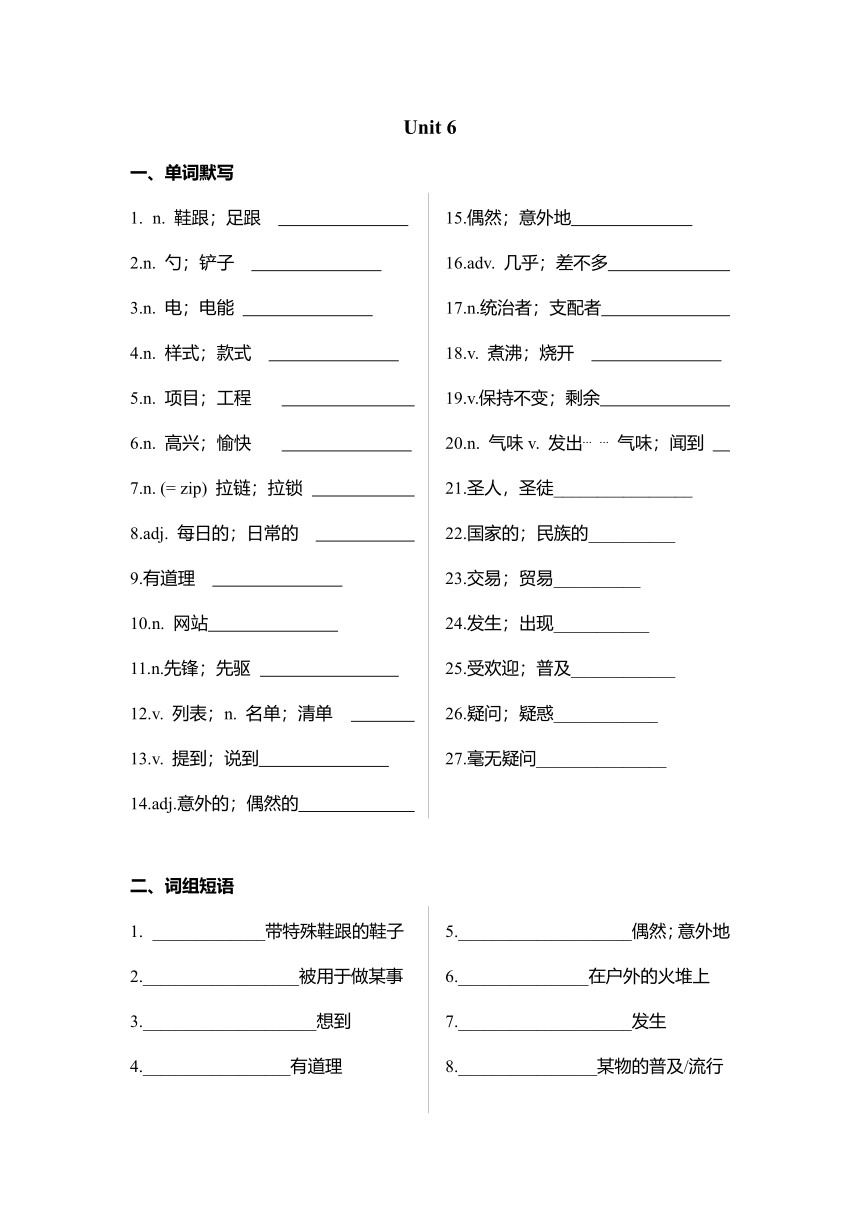 | |
| 格式 | docx | ||
| 文件大小 | 25.8KB | ||
| 资源类型 | 教案 | ||
| 版本资源 | 人教新目标(Go for it)版 | ||
| 科目 | 英语 | ||
| 更新时间 | 2023-10-27 16:45:12 | ||
图片预览

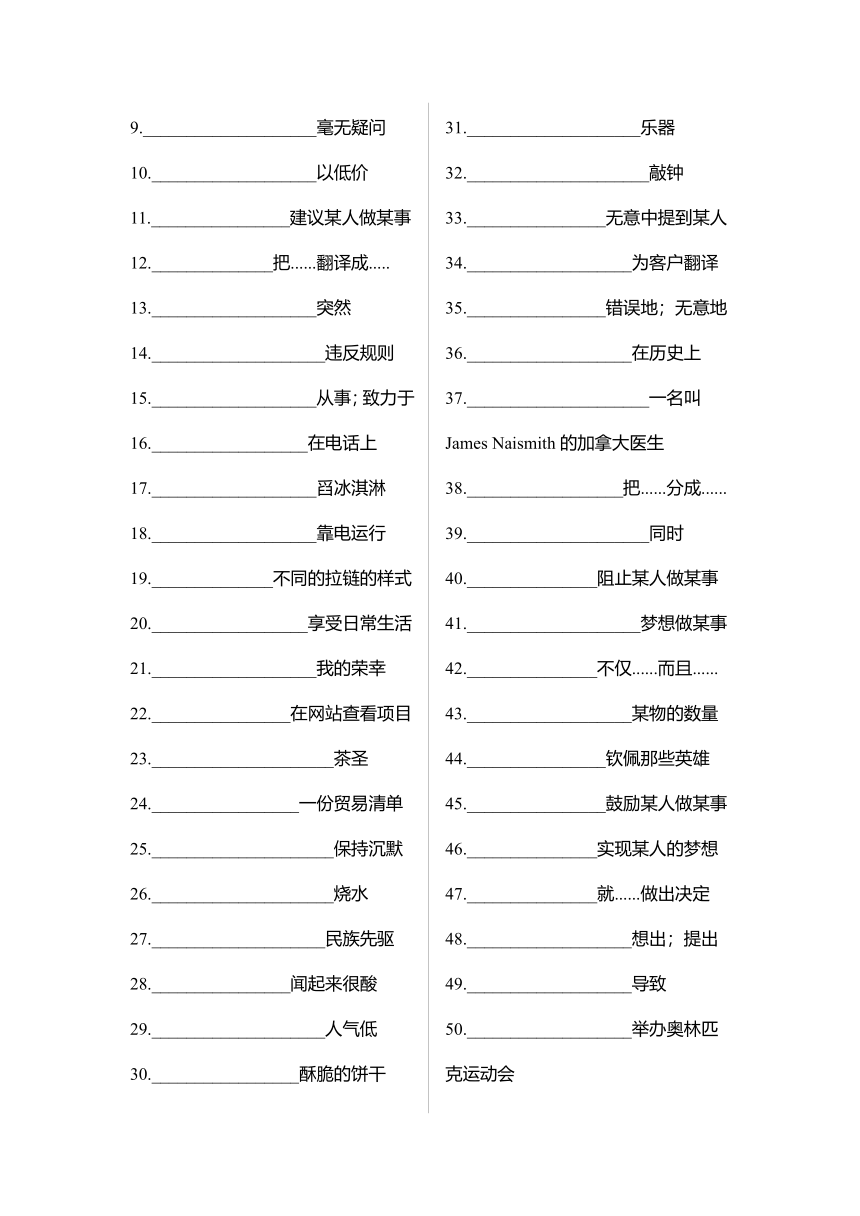
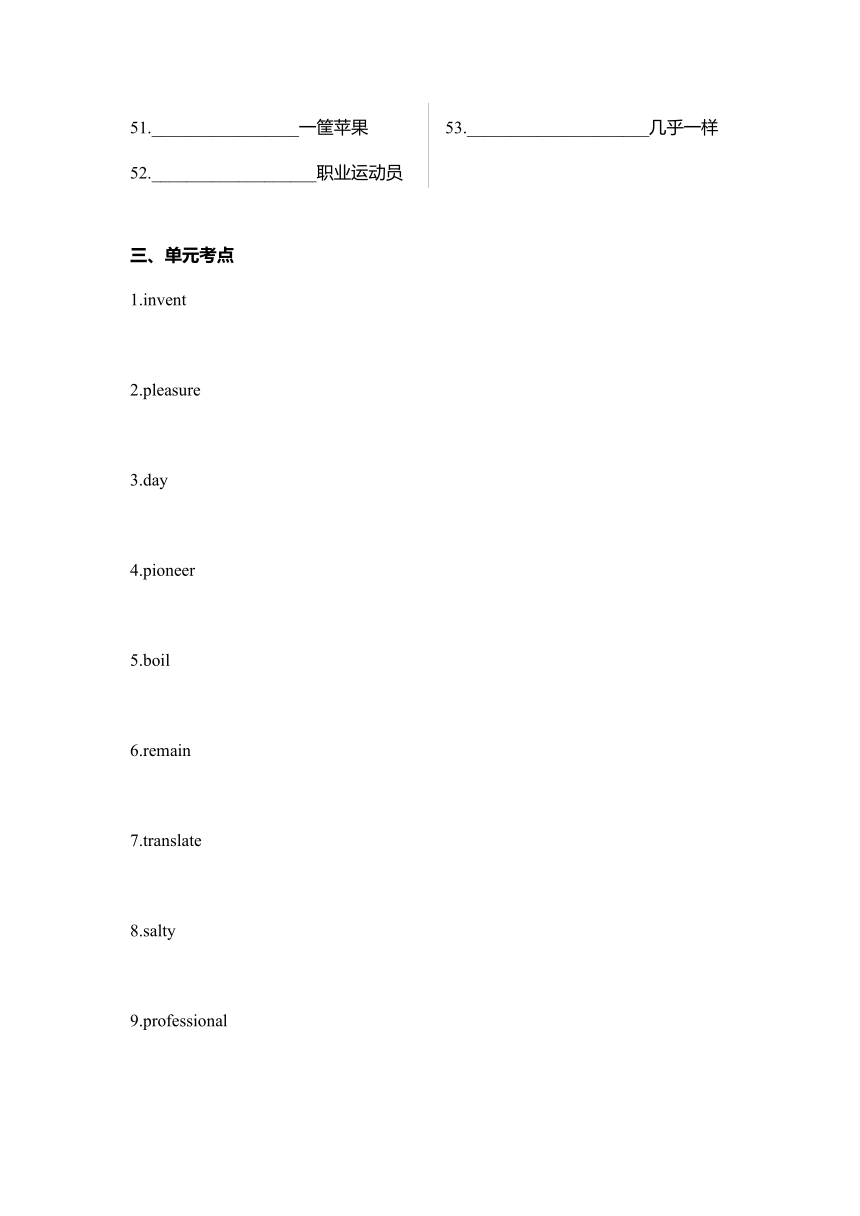
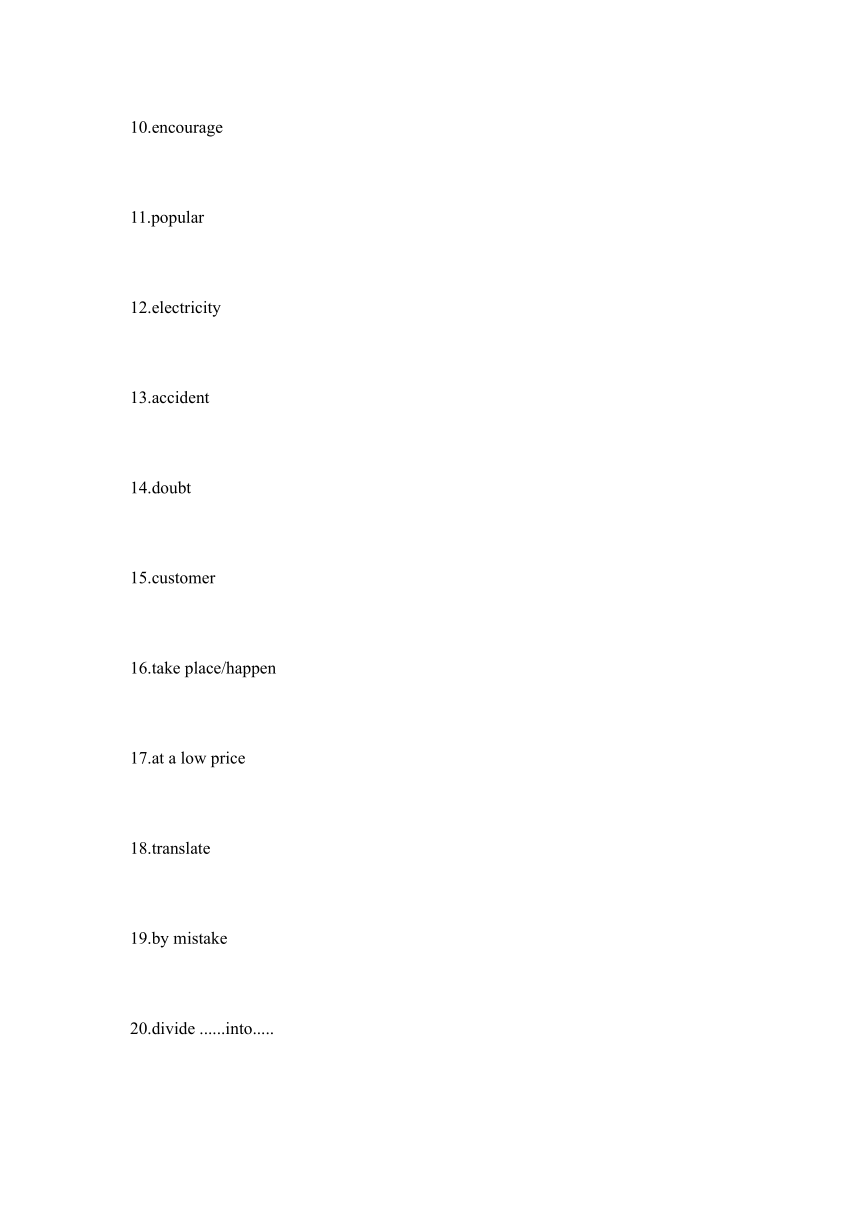
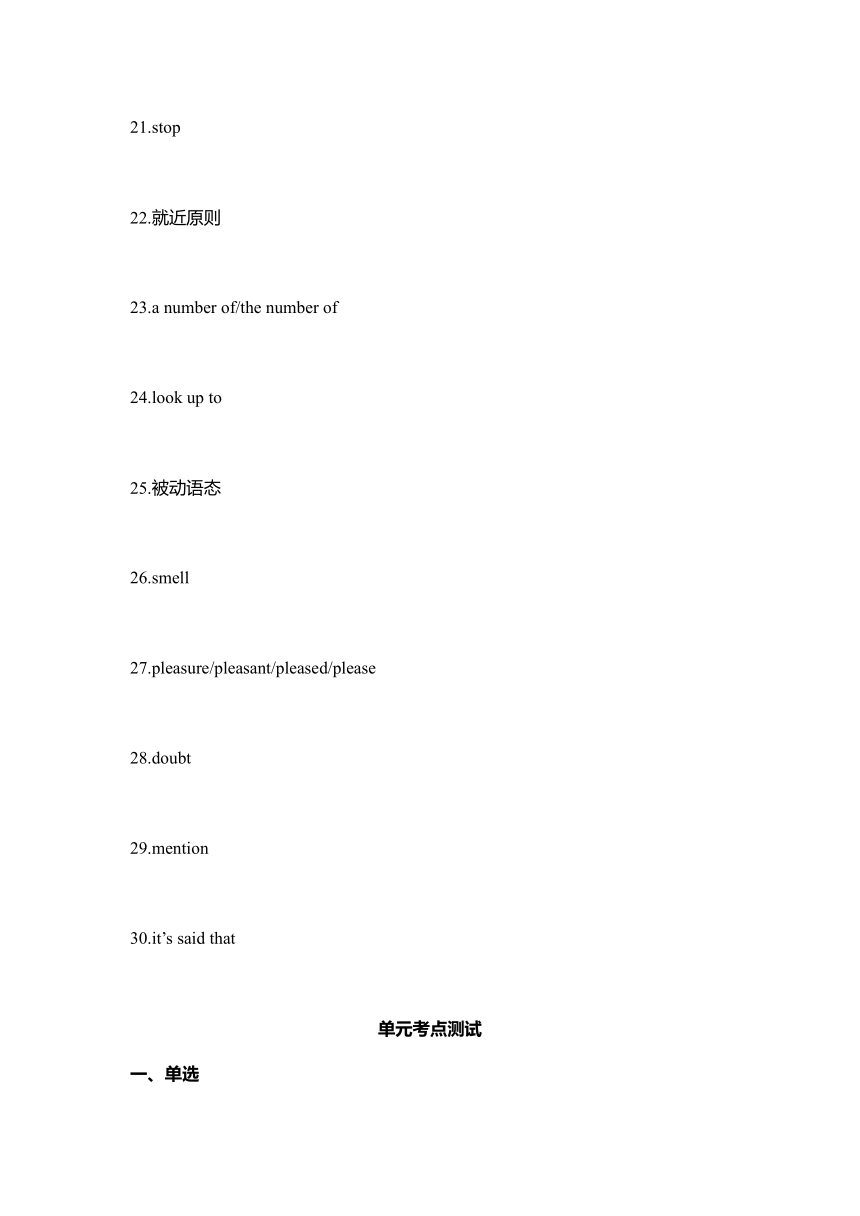
文档简介
Unit 6
一、单词默写
n. 鞋跟;足跟
2.n. 勺;铲子
3.n. 电;电能
4.n. 样式;款式
5.n. 项目;工程
6.n. 高兴;愉快
7.n. (= zip) 拉链;拉锁
8.adj. 每日的;日常的
9.有道理
10.n. 网站
11.n.先锋;先驱
12.v. 列表;n. 名单;清单
13.v. 提到;说到
14.adj.意外的;偶然的
15.偶然;意外地
16.adv. 几乎;差不多
17.n.统治者;支配者
18.v. 煮沸;烧开
19.v.保持不变;剩余
20.n. 气味v. 发出 气味;闻到
21.圣人,圣徒________________
22.国家的;民族的__________
23.交易;贸易__________
24.发生;出现___________
25.受欢迎;普及____________
26.疑问;疑惑____________
27.毫无疑问_______________
词组短语
_____________带特殊鞋跟的鞋子
2.__________________被用于做某事
3.____________________想到
4._________________有道理
5.____________________偶然;意外地
6._______________在户外的火堆上
7.____________________发生
8.________________某物的普及/流行
9.____________________毫无疑问
10.___________________以低价
11.________________建议某人做某事
12.______________把......翻译成.....
13.___________________突然
14.____________________违反规则
15.___________________从事;致力于
16.__________________在电话上
17.___________________舀冰淇淋
18.___________________靠电运行
19.______________不同的拉链的样式
20.__________________享受日常生活
21.___________________我的荣幸
22.________________在网站查看项目
23._____________________茶圣
24._________________一份贸易清单
25._____________________保持沉默
26._____________________烧水
27.____________________民族先驱
28.________________闻起来很酸
29.____________________人气低
30._________________酥脆的饼干
31.____________________乐器
32._____________________敲钟
33.________________无意中提到某人
34.___________________为客户翻译
35.________________错误地;无意地
36.___________________在历史上
37._____________________一名叫James Naismith的加拿大医生
38.__________________把......分成......
39._____________________同时
40._______________阻止某人做某事
41.____________________梦想做某事
42._______________不仅......而且......
43.___________________某物的数量
44.________________钦佩那些英雄
45.________________鼓励某人做某事
46._______________实现某人的梦想
47._______________就......做出决定
48.___________________想出;提出
49.___________________导致
50.___________________举办奥林匹克运动会
51._________________一筐苹果
52.___________________职业运动员
53._____________________几乎一样
单元考点
1.invent
2.pleasure
3.day
4.pioneer
5.boil
6.remain
7.translate
8.salty
9.professional
10.encourage
11.popular
12.electricity
13.accident
14.doubt
15.customer
16.take place/happen
17.at a low price
18.translate
19.by mistake
20.divide ......into.....
21.stop
22.就近原则
23.a number of/the number of
24.look up to
25.被动语态
26.smell
27.pleasure/pleasant/pleased/please
28.doubt
29.mention
30.it’s said that
单元考点测试
一、单选
1.—How was your skating lesson last week ______
—Not bad. Although I fell over many times, I managed to skate at last.
A. in the end B. at present C. at times
2. Miss Chen, my dear English teacher, often encourages me ______ the challenges in my study.
A. face B. faces C. facing D. to face
3. A break between classes is a good time for students to play sports and talk with their classmates. So it ______ helps with students’ health, ______ improves their social skills.
A. either; or B. neither; nor C. not only; but also D. both and
4. After years of war, the people in Syria are thirsty for ______.
A. price B. noise C. peace D. course
5. I could ______ control my feelings at the moment. The movie reminds me of my childhood.
A. really B. nearly C. slowly D. hardly
6. Many big events like the Olympic Games _________in that city last year, and it got tons of attention from the whole world.
happened B. took place
C. were happened D. were taken place
7. The mobile phone is quite helpful to everyone. For example. it can be ____watching videos.
A. used as B. used for C. used by D. used to
8. Many of Mo Yan's novels________ into foreign languages recently. And it seems that they are popular around the world.
translated B. have translated
C. are translated D. were translated
9. Not only his friends but also he _______ happy when they heard of the exciting news.
A. is B. are C. was D. were
10.________ students in our class ________ going to the summer camp in Beijing next week.
A. Two fifths; is B. Second fifths; are
C. Second fifths; is D. Two fifths; are
二、阅读
Huge beasts, one male and one female, protect the entrances to palaces, temples and other important buildings in China. These lion statues lie at the sides of the entrances to restaurants and shopping malls as well (the pair in the picture stand guard within the Forbidden City). They are also found in Chinese communities around the world. In Chinese culture, the lion is a symbol of strength and good luck and defends against something bad.
Whether made of stone or metal, these big and heavy statues are always used in pairs, one on each side of a door or gate. Looking out on the left (your right as you move towards the entrance) is the male lion, with his right front paw on a ball that stands for the world. On the other side, the female lion rests her left paw on a baby lion, standing for the raising of life. The two lions show us the Chinese idea of yin and yang: opposites that create one whole. In the mouths of some lion statues is a big pearl, a symbol of wisdom and power. These statues are designed so that the pearl can move around but not be removed.
Historians believe lions were brought to China during the Han Dynasty (206 B.C.-220 A.D.), a time of increasing trade along the Silk Road. The lions were from Central Asia and were smaller than the more familiar African lion. Interestingly, in China, unlike in the West, these statues are never called “fu dogs”. Here are some interpretations: some think the lions are like Chinese dogs, such as the shih tzu (狮子狗), chowchow and so on. Others say that “fu” sounds like the Chinese word for “success” and the word for “Buddha”.
1.People place the lion statues at the sides of the entrance because ________.
A.they are from the Forbidden City B.they can fight against bad people
C.they are important buildings in China D.they stand for strength and good luck
2.Paragraph 2 is mainly about ________.
A.what the lion statues are made of B.what the lion statues stand for
C.how much people like the lion statues D.where the lion statues come from
3.The underlined words “interpretations” in Paragraph 3 mean ________.
A.agreements. B.collections
C.explanations D.translations
4.The passage was probably written by ________.
A.a person who likes animals very much
B.a businessman who runs shopping mall
C.a foreigner who designs stone or metal lions
D.a researcher who is interested in historical treasure
三、用所给词的适当形式填空
1.Although he’s _________ (near) fifty, he can still play tennis with the best.
2.October 1st is the __________ (nation) Day of China.
3.King is the ___________ (rule) of a country.
4.Can you play the _____________ (music) instrument
5.I think _____________ (boil) water is the best drink.
6.His name ________(list) on a piece of paper.
7.Stay away from the ________(boil) water, because it is very hot.
8.They ________ (ring) the bell and came into the room.
9.________ (sudden), the candle was blew out by the wind.
10.The ________(lock) locker was opened by somebody unknown.
四、完成句子
1.它真是如此了不起的一项发明吗
Is it really such a great ____________
想想它在我们的日常生活中多么频繁地被使用吧。
________________ how often it's used in our daily lives.
那里列举了不同发明的创始者。
The _________ of different inventions were listed there.
茶是怎样被偶然发明的
How tea was invented _________ _________.
5.据说一位号称神农的中国统治者最早发现了茶可以饮用。
______ _____ ______ _____ a Chinese ruler called Shen Nong was the first to discover tea as a drink.
6.我确信他最终会实现梦想。
I am sure he will his dream .
7.老师上星期把学生分成两组。
The teacher the students two groups last week.
8.达芬奇不仅是一名画家还是很多领域的先锋。如果列出他的成就,就会知道他有多伟大。
Da Vinci was not only a painter, but also a in many areas. If you of his achievements, you will know how great he was!
9.我们认为露西会谈到很多关于她项目的事情,但是她一点也没提到。
We thought Lucy would say a lot about her , but she didn’t it at all.
10.大卫被告知他有音乐天赋。
David that he had .
一、单词默写
n. 鞋跟;足跟
2.n. 勺;铲子
3.n. 电;电能
4.n. 样式;款式
5.n. 项目;工程
6.n. 高兴;愉快
7.n. (= zip) 拉链;拉锁
8.adj. 每日的;日常的
9.有道理
10.n. 网站
11.n.先锋;先驱
12.v. 列表;n. 名单;清单
13.v. 提到;说到
14.adj.意外的;偶然的
15.偶然;意外地
16.adv. 几乎;差不多
17.n.统治者;支配者
18.v. 煮沸;烧开
19.v.保持不变;剩余
20.n. 气味v. 发出 气味;闻到
21.圣人,圣徒________________
22.国家的;民族的__________
23.交易;贸易__________
24.发生;出现___________
25.受欢迎;普及____________
26.疑问;疑惑____________
27.毫无疑问_______________
词组短语
_____________带特殊鞋跟的鞋子
2.__________________被用于做某事
3.____________________想到
4._________________有道理
5.____________________偶然;意外地
6._______________在户外的火堆上
7.____________________发生
8.________________某物的普及/流行
9.____________________毫无疑问
10.___________________以低价
11.________________建议某人做某事
12.______________把......翻译成.....
13.___________________突然
14.____________________违反规则
15.___________________从事;致力于
16.__________________在电话上
17.___________________舀冰淇淋
18.___________________靠电运行
19.______________不同的拉链的样式
20.__________________享受日常生活
21.___________________我的荣幸
22.________________在网站查看项目
23._____________________茶圣
24._________________一份贸易清单
25._____________________保持沉默
26._____________________烧水
27.____________________民族先驱
28.________________闻起来很酸
29.____________________人气低
30._________________酥脆的饼干
31.____________________乐器
32._____________________敲钟
33.________________无意中提到某人
34.___________________为客户翻译
35.________________错误地;无意地
36.___________________在历史上
37._____________________一名叫James Naismith的加拿大医生
38.__________________把......分成......
39._____________________同时
40._______________阻止某人做某事
41.____________________梦想做某事
42._______________不仅......而且......
43.___________________某物的数量
44.________________钦佩那些英雄
45.________________鼓励某人做某事
46._______________实现某人的梦想
47._______________就......做出决定
48.___________________想出;提出
49.___________________导致
50.___________________举办奥林匹克运动会
51._________________一筐苹果
52.___________________职业运动员
53._____________________几乎一样
单元考点
1.invent
2.pleasure
3.day
4.pioneer
5.boil
6.remain
7.translate
8.salty
9.professional
10.encourage
11.popular
12.electricity
13.accident
14.doubt
15.customer
16.take place/happen
17.at a low price
18.translate
19.by mistake
20.divide ......into.....
21.stop
22.就近原则
23.a number of/the number of
24.look up to
25.被动语态
26.smell
27.pleasure/pleasant/pleased/please
28.doubt
29.mention
30.it’s said that
单元考点测试
一、单选
1.—How was your skating lesson last week ______
—Not bad. Although I fell over many times, I managed to skate at last.
A. in the end B. at present C. at times
2. Miss Chen, my dear English teacher, often encourages me ______ the challenges in my study.
A. face B. faces C. facing D. to face
3. A break between classes is a good time for students to play sports and talk with their classmates. So it ______ helps with students’ health, ______ improves their social skills.
A. either; or B. neither; nor C. not only; but also D. both and
4. After years of war, the people in Syria are thirsty for ______.
A. price B. noise C. peace D. course
5. I could ______ control my feelings at the moment. The movie reminds me of my childhood.
A. really B. nearly C. slowly D. hardly
6. Many big events like the Olympic Games _________in that city last year, and it got tons of attention from the whole world.
happened B. took place
C. were happened D. were taken place
7. The mobile phone is quite helpful to everyone. For example. it can be ____watching videos.
A. used as B. used for C. used by D. used to
8. Many of Mo Yan's novels________ into foreign languages recently. And it seems that they are popular around the world.
translated B. have translated
C. are translated D. were translated
9. Not only his friends but also he _______ happy when they heard of the exciting news.
A. is B. are C. was D. were
10.________ students in our class ________ going to the summer camp in Beijing next week.
A. Two fifths; is B. Second fifths; are
C. Second fifths; is D. Two fifths; are
二、阅读
Huge beasts, one male and one female, protect the entrances to palaces, temples and other important buildings in China. These lion statues lie at the sides of the entrances to restaurants and shopping malls as well (the pair in the picture stand guard within the Forbidden City). They are also found in Chinese communities around the world. In Chinese culture, the lion is a symbol of strength and good luck and defends against something bad.
Whether made of stone or metal, these big and heavy statues are always used in pairs, one on each side of a door or gate. Looking out on the left (your right as you move towards the entrance) is the male lion, with his right front paw on a ball that stands for the world. On the other side, the female lion rests her left paw on a baby lion, standing for the raising of life. The two lions show us the Chinese idea of yin and yang: opposites that create one whole. In the mouths of some lion statues is a big pearl, a symbol of wisdom and power. These statues are designed so that the pearl can move around but not be removed.
Historians believe lions were brought to China during the Han Dynasty (206 B.C.-220 A.D.), a time of increasing trade along the Silk Road. The lions were from Central Asia and were smaller than the more familiar African lion. Interestingly, in China, unlike in the West, these statues are never called “fu dogs”. Here are some interpretations: some think the lions are like Chinese dogs, such as the shih tzu (狮子狗), chowchow and so on. Others say that “fu” sounds like the Chinese word for “success” and the word for “Buddha”.
1.People place the lion statues at the sides of the entrance because ________.
A.they are from the Forbidden City B.they can fight against bad people
C.they are important buildings in China D.they stand for strength and good luck
2.Paragraph 2 is mainly about ________.
A.what the lion statues are made of B.what the lion statues stand for
C.how much people like the lion statues D.where the lion statues come from
3.The underlined words “interpretations” in Paragraph 3 mean ________.
A.agreements. B.collections
C.explanations D.translations
4.The passage was probably written by ________.
A.a person who likes animals very much
B.a businessman who runs shopping mall
C.a foreigner who designs stone or metal lions
D.a researcher who is interested in historical treasure
三、用所给词的适当形式填空
1.Although he’s _________ (near) fifty, he can still play tennis with the best.
2.October 1st is the __________ (nation) Day of China.
3.King is the ___________ (rule) of a country.
4.Can you play the _____________ (music) instrument
5.I think _____________ (boil) water is the best drink.
6.His name ________(list) on a piece of paper.
7.Stay away from the ________(boil) water, because it is very hot.
8.They ________ (ring) the bell and came into the room.
9.________ (sudden), the candle was blew out by the wind.
10.The ________(lock) locker was opened by somebody unknown.
四、完成句子
1.它真是如此了不起的一项发明吗
Is it really such a great ____________
想想它在我们的日常生活中多么频繁地被使用吧。
________________ how often it's used in our daily lives.
那里列举了不同发明的创始者。
The _________ of different inventions were listed there.
茶是怎样被偶然发明的
How tea was invented _________ _________.
5.据说一位号称神农的中国统治者最早发现了茶可以饮用。
______ _____ ______ _____ a Chinese ruler called Shen Nong was the first to discover tea as a drink.
6.我确信他最终会实现梦想。
I am sure he will his dream .
7.老师上星期把学生分成两组。
The teacher the students two groups last week.
8.达芬奇不仅是一名画家还是很多领域的先锋。如果列出他的成就,就会知道他有多伟大。
Da Vinci was not only a painter, but also a in many areas. If you of his achievements, you will know how great he was!
9.我们认为露西会谈到很多关于她项目的事情,但是她一点也没提到。
We thought Lucy would say a lot about her , but she didn’t it at all.
10.大卫被告知他有音乐天赋。
David that he had .
同课章节目录
- Unit 1 How can we become good learners.
- Section A
- Section B
- Unit 2 I think that mooncakes are delicious!
- Section A
- Section B
- Unit 3 Could you please tell me where the restroom
- Section A
- Section B
- Unit 4 I used to be afraid of the dark.
- Section A
- Section B
- Unit 5 What are the shirts made of?
- Section A
- Section B
- Review of Units 1-5
- Unit 6 When was it invented?
- Section A
- Section B
- Unit 7 Teenagers should be allowed to choose their
- Section A
- Section B
- Unit 8 It must belong to Carla.
- Section A
- Section B
- Unit 9 I like music that I can dance to.
- Section A
- Section B
- Unit 10 You're supposed to shake hands.
- Section A
- Section B
- Review of Units 6-10
- Unit 11 Sad movies make me cry.
- Section A
- Section B
- Unit 12 Life is full of the unexpected
- Section A
- Section B
- Unit 13 We're trying to save the earth!
- Section A
- Section B
- Unit 14 I remember meeting all of you in Grade 7.
- Section A
- Section B
- Review of Units 11-14
